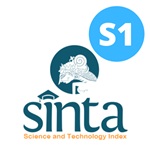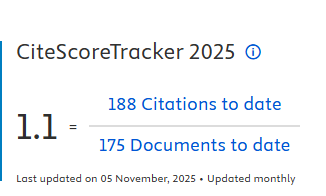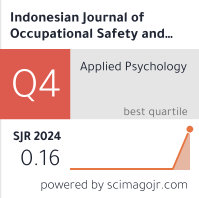HUBUNGAN STATUS GIZI, KARAKTERISTIK INDIVIDU DENGAN PRODUKTIVITAS PEKERJA SORTING DAN PACKING
Downloads
Good nutritional status affects physical and intellectual of activeness, productivity and veracity. Performance reaches of productivity in the mid-twenties and it declines with ages. Experience increases exponentially with tenure, and it can be seen from the level of educational attainment and skills. The objective of this study is to investigate relationship nutritional status, individual characteristics with productivity of sorting and packing employees of PT. DPG Muliakeramik Group. Primary and secondary data were employed as the source of data. The data were then processed and analysed descriptively. This research was observational and included field research with cross sectional design. Population of this study were sorting and packing employees of PT. DPG Muliakeramik Group with the total of 14 employees, and total sampling was used as the sampling method of this study. Nutritional status data were obtained from direct IMT. Interview with company's representatives was taken to obtain information about individual characteristics (ages, tenure and education level) and workforce productivity. The collected data were then analysed using cross tabulation. The results indicated that most respondents have normal nutritional status (IMT). Most respondents were aged 26-35 years old with less than 6 years tenure, and most of them were graduated from Senior High School. The results of this study also indicated that most respondents have above average productivity. There is no relationship tenure, educational level with workforce productivity. This study is suggested that PT. DPG Muliakeramik Group could adjust workplace nutrition and give nutritional counselling for employees about the importance of consuming balanced nutrition.
Keywords: nutritional status, individual characteristics, productivity
Anderson, L.W., Krathwohl, D.R. 2009. Pembelajaran, Pengajaran dan Assessment. Yogyakarta: Pustaka Pelajar.
Budiono, A.M.S. 2003. Bunga Rampai Hiperkes dan K3. Semarang: Badan Penerbit Universitas Diponegoro.
Farikha, R.R.P. 2016. Hubungan Status Gizi dengan Produktivitas Kerja Pekerja Bagian Sorting and Packing (Studi Kasus di PT. DPG Muliakeramik Group, Ngoro-Jawa Timur). Skripsi. Surabaya: FKM Universitas Airlangga Surabaya.
Puspitasari, K.M. 2013. Pengaruh Tingkat Pendidikan dan Pengalaman Kerja terhadap Produktivitas Kerja Karyawan Bagian Weaving 2 di PT. Kusumahadi Santoso Karanganyar Periode Januari-Juni Tahun
Skripsi. Surakarta: Fakultas Keguruan dan
Ilmu Pendidikan Universitas Sebelas Maret. Putra, P.A.W.S., I Ketut Sutrisna. 2013. Faktor- faktor yang Memengaruhi Produktivitas Pekerja Pada Industri Kerajinan Sanggah di Desa Jehem Kabupaten Bangli. E-Jurnal EP Unud, 2 [8]: 359–366. Fakultas Ekonomi dan Bisnis Universitas Udayana.
Robbins, S.P. 2007. Management. Edisi 9. New Jersey: Pearson Education.
Sastrohadiwiryo, B.S. 2002. Manajemen Pekerja Indonesia Pendekatan Administrasi dan Operasional. Jakarta: Bumi Aksara.
Siagian, S.P. 2008. Manajemen Sumber Daya Manusia. Jakarta: PT. Bumi Aksara.
Sudarsono, S. 2008. Bank & Lembaga Keuangan Syari'ah. Yogyakarta: Ekonisia.
Suma'mur, P.K. 2009. Hygiene Perusahaan dan Kesehatan Kerja. Jakarta: Gunung Agung.
Sunar. 2012. Pengaruh Faktor Biografis (Usia, Masa Kerja, dan Gender) terhadap Produktivitas Karyawan (Studi Kasus PT Bank X). Jurnal Volume 9 Nomer 1, Mei 2012. Jakarta: Universitas Borobudur.
Sutrisno, E. 2009 Manajemen Sumber Daya Manusia. Jakarta: Kencana Prenada Media Group.
Tarigan, Y.W. 2009. Kontribusi Protective Factors terhadap Resilience Wanita
DewasaAwal Penderita Systemic Lupus Erythematosus di Yayasan ‘X' Bandung. Skripsi. Fakultas Psikologi Universitas Kristen Maranatha.
Tarwaka., Sholichul HAB., Lilik S. 2004. Ergonomi untuk Keselamatan, Kesehatan Kerja dan Produktivitas. Surakarta: Uniba Press.
Utami, S.R. 2012. Status Gizi, Kebugaran Jasmani dan Produktivitas Kerja pada Pekerja Wanita. Jurnal Kemas 8 [1]: 74–80 Semarang: Universitas Negeri Semarang.

In order to be accepted and published by The Indonesian Journal of Occupational Safety and Health, Author(s) who submit an article should complete all the review process. The copyright of received articles assigned to the The Indonesian Journal of Occupational Safety and Health and Department of Safety and Health, Universitas Airlangga as publishers of the journal. The intended copyright includes the rights to publish articles in various forms (including reprints).
The Editorial Team of The Indonesian Journal Of Occupational Safety and Health and Department of Safety and Health strive to ensure that no errors occur in the articles that have been published, both data errors and statements in the article.
Users of this website will be licensed to use materials from this website following the Creative Commons Attribution-NonCommercial-ShareAlike 4.0 International License. No fees charged. Please use the materials accordingly.
------------------------------------------------------------------------------------------------------------------------------------------------------------------------------------------
Attribution ” You must give appropriate credit, provide a link to the license, and indicate if changes were made. You may do so in any reasonable manner, but not in any way that suggests the licensor endorses you or your use.
NonCommercial ” You may not use the material for commercial purposes.
ShareAlike ” If you remix, transform, or build upon the material, you must distribute your contributions under the same license as the original.







 How to Submit Articles in OJS
How to Submit Articles in OJS

























